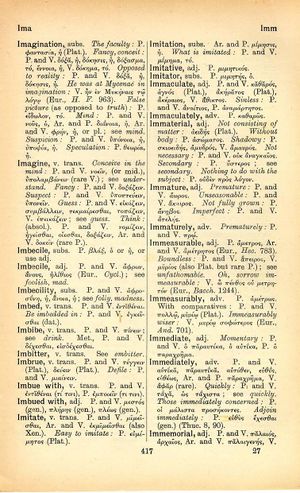immeasurably: Difference between revisions
From LSJ
ὁμοῦ ἦν καὶ ἔχειν τὴν πόλιν καὶ τὸ γένος ὅλον μετὰ τῆς πόλεως → it was much the same thing to have the city and to have the whole race together with the city
(CSV4) |
m (Woodhouse1 replacement) |
||
| Line 1: | Line 1: | ||
{{Woodhouse1 | {{Woodhouse1 | ||
|Text=[[File:woodhouse_417.jpg|thumb|link={{filepath:woodhouse_417.jpg}}]] | |Text=[[File:woodhouse_417.jpg|thumb|link={{filepath:woodhouse_417.jpg}}]] | ||
P. ἀμέτρως. | ===adverb=== | ||
[[prose|P.]] [[ἀμέτρως]]. | |||
[[with comparatives]]: [[prose|P.]] and [[verse|V.]] [[πολλῷ]], [[μυρίῳ]] ([[Plato]]). | |||
[[immeasurably wiser]]: [[verse|V.]] [[μυρίῳ σοφώτερος]] ([[Euripides|Eur.]], ''[[Andromache]]'' 701). | |||
}} | }} | ||
Revision as of 08:59, 20 May 2020
English > Greek (Woodhouse)
adverb
with comparatives: P. and V. πολλῷ, μυρίῳ (Plato).
immeasurably wiser: V. μυρίῳ σοφώτερος (Eur., Andromache 701).

